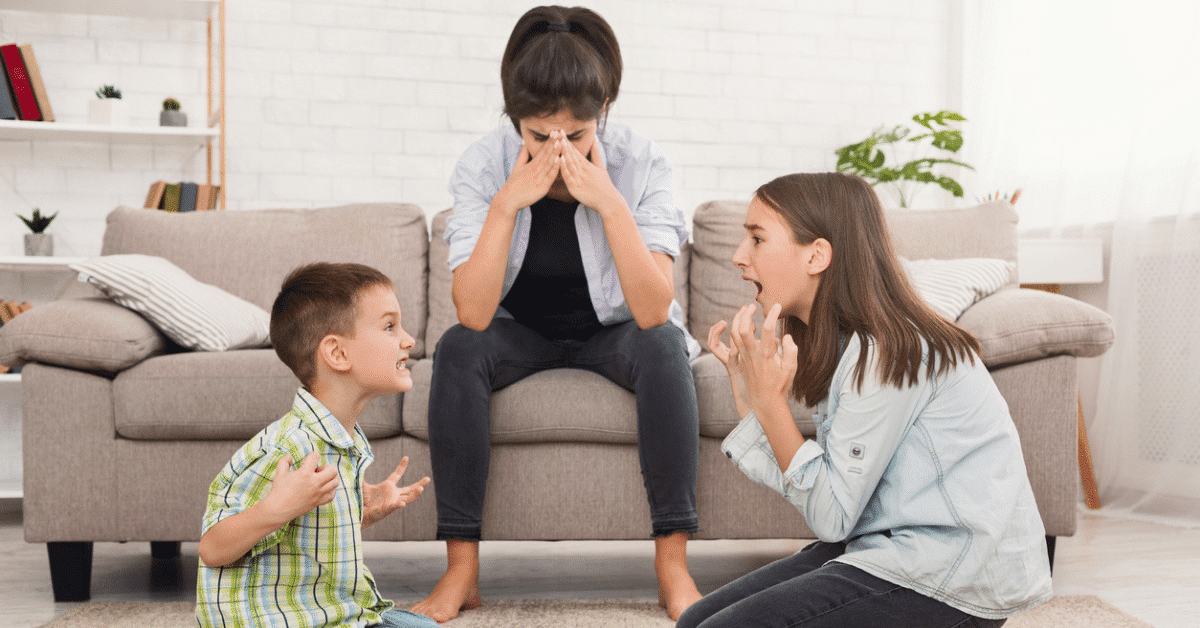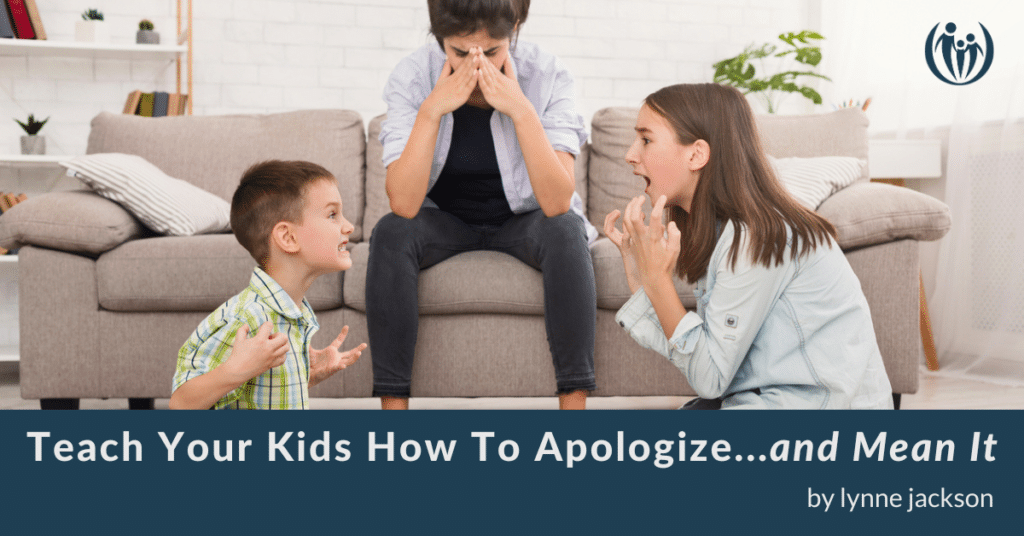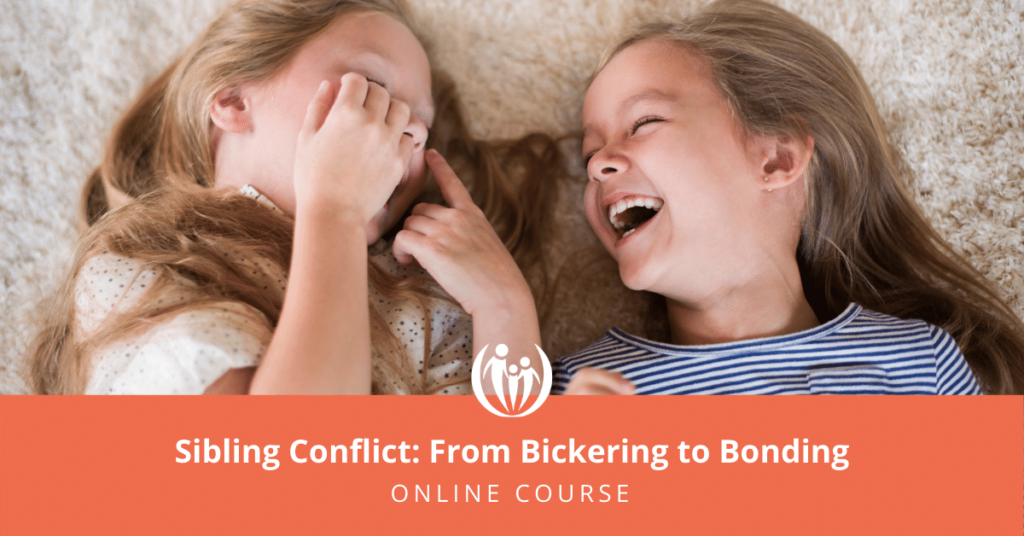
Teach Your Kids How To Apologize…and Mean It

Do you ever feel like the selfish, hurtful attitudes of your kids are enough to make you pull your hair out? (Or theirs?) “How can they be so mean to each other? I’m so sick of this!” What are some ways we can teach our kids how to say sorry?
When you engage with your kids during conflict, there might be a simple reason that you feel exasperated and ineffective. In a busy, stressed family, it’s easy to ignore sibling conflict until it erupts. And then use default strategies of separation, forced apologies, or punishment.
Your goal might be getting some peace and quiet ASAP. “Go to your room until you can say you’re sorry!” Or, “No screens for either of you until you can get along.”
Peace and quiet? Not really. Quiet maybe, but no real peace. Trying to quickly stomp out sibling conflict is like a game of “Whack-a-mole”. A bunch of random and fast-paced whacking at the latest conflict that is rearing its head. Sometimes you “score” by stopping it right away, sometimes you don’t. But you never get to the heart of the matter and you’ll probably grow simmering resentment that re-erupts at the next small infraction.
If you’re trying to be more strategic than that, you might be wrestling with questions like:
- “Should I force an apology?”
- “What really is a true apology?”
- “How do I get my kids to say sorry and mean it?”
Our beliefs about conflict carry into our parenting
I certainly had “been there, done that” with both “whack-a-mole” approaches and wrestling with hard questions in the early years! Over time, I realized there were even better, deeper questions to consider first. I share my story in our book, Discipline That Connects With Your Child’s Heart.
We each played a defined part in a thoroughly choreographed dance: Daniel bossed, taunted, or hit; Bethany whined, wailed, or screamed; I lunged in as Crazy Mama, ready to punish. I knew my kids were precious miracles created for God’s glory, yet I completely lost sight of this when they fought. And fought. And kept on fighting.
My first step in addressing these dynamics was to look below the surface at what was going on in my heart. I saw that part of this wasn’t about the present; it had to do with my own past. When I was young, my older brothers teased and occasionally harassed me—not excessively, but still I hated how that felt, and some of the feelings still lingered. I realized I was targeting Daniel with my judgments about big brothers who picked on little sisters.
The question “What’s going on in me about this issue?” is a staple at Connected Families, and part of building a firm Foundation for guiding our kids. Addressing our own history with conflict reveals a set of beliefs from our formative years we carry with us into parenthood. The ones we hear most often are:
- Conflict is bad and to be avoided. (Common in families where conflict is suppressed.)
- Winning conflicts is the goal. (Common in families where conflict is readily expressed.)
- Losing conflicts or admitting fault is weak and shameful.
3 scenarios that might sound familiar
Here are some stories from parents in our Connected Families community about their own experience with conflict and how those beliefs were seeping into their parenting. These insightful parents learned to unpack some of the beliefs they were bringing into conflict in their home. Do any of these sound familiar?
Conflict avoidance
Diane stated honestly, “I’m so anxious every time there’s conflict in our house, and it makes it so hard to engage well.” She revealed a part of her story that fed her anxiety, sharing, “My parents never argued – that we knew of. And then one day they just got divorced.” Sadly, Diane believed, “Conflict is bad, insidious, and destructive and you never know when the results will be disastrous.”
Bullying
Janelle was concerned about her daughter’s “bullying” of her younger siblings, and figured it was because her daughter was being bullied by someone else. Then came Janelle’s lightbulb moment: “ I realized it’s me. I had this idea that, ‘I’m the mom, so I can use whatever tone of voice I need to, to get my point across.’” As she realized this, Janelle dug deeper: “Why am I the bully? Because I’m feeling poorly about myself.”
Setting an example
Lisa also realized the power of her example: “No wonder my kids don’t get along. They’re watching how my husband and I relate as a couple. We argue a lot, but never actually have any healthy conflict resolution.”
When you feel one child is a bully
Many parents have shared that they struggle with resentful beliefs about one child being a “bully” or “the problem.” This child almost always senses this, feels angry and ashamed as they “fulfill that identity,” and increasingly resents the more “angelic” or favored child.
Many other parents believe that they themselves are the problem, or a failure, if their kids fight a lot. It’s nearly impossible to engage in a helpful way if failure-focused beliefs about either you or your child are driving your engagement.
So let’s begin to bring God’s grace and truth into your beliefs about conflict.
A vital starting place, for helping kids get along, is to be honest and take stock of what you believe about conflict and what you model in your own conflicts with others.
This is not quick and easy work. It’s where prayer and spiritual growth meets life’s hard realities.
Search me, God, and know my heart;
test me and know my anxious thoughts.
See if there is any offensive way in me,
and lead me in the way everlasting. Psalm 139:23,24
It can be painful to do this sort of honest self-reflection. But it is an essential first step toward healthy, graceful conflict engagement and resolution. If your starting place for dealing with sibling conflict is to point fingers of blame at your kids, we will only feed the discouragement that fuels their conflict.
What does healthy conflict resolution look like?
Healthy conflict resolution was a tough issue for Jim and me as we started our family. His assertive personality and expressive family background was an interesting combination with my quieter personality and “keep the peace” family background. (I never heard my parents argue.)
Our first chance to establish our unique beliefs and conflict style came shortly after we got engaged. I was upset about something, quiet, and not wanting to talk about it. When Jim asked what was wrong, I insisted it was no big deal, and not worth talking about. He responded, “We are going to have a marriage that resolves conflict, not avoids it.” With a little grin, he stopped the car and said “I’m not moving until we start talking about this.” Our adventure into healthy conflict resolution had begun.
4 guidelines for healthy conflict resolution
Over time we identified some important beliefs about conflict that guided our family’s conflict resolution. This is what we shared and modeled for our kids:
- We’ve all got sin that collides with the sin of those we love. It’s part of life. It’s not shameful or something to be hidden behind closed doors.
- God’s grace and the practical truths of scripture are our guiding light for conflict.
- Resolving conflict is a valuable gift. It protects our most precious relationships.
- Resolving conflict is holy. It’s built on our own reconciliation with God.
Should we fight in front of our kids?
You might be wondering, “Did you really fight in front of your kids?” For most topics – yes. Our advice is to have disagreements about age-appropriate topics in front of the kids – conscious that they are learning by watching, with reconciliation as the goal. We had plenty of opportunities when our kids were little and stress was high!
It wasn’t always perfect! In fact it was often messy. If any of our kids seemed uncomfortable with our conflict, we would remind them we were working hard to resolve conflict and keep our marriage and our family strong. They were often quite curious and would even eagerly hush in the back seat if we were having a quiet, serious conversation up front. We were tenacious to take this process across the finish line, usually until we could “kiss and make up” in front of them.
This commitment to our own reconciliation was the foundation on which we built their value of reconciliation.
And then of course, we also got to model these beliefs in the conflicts we had with our children. If we were selfish, harsh, or unreasonably demanding (or all of the above!) our best modeling was to confess and ask for forgiveness and maybe a do-over. This honesty and hard work built a value for humility and restoration that eventually made its way into the kids’ conflicts with each other.
This commitment to our own reconciliation was the foundation on which we built their value of reconciliation.
The fruit of our work to teach our kids the value of reconciliation was, as a teen, our son stated, “I love apologizing, because I can take the wrong I’ve done, cast it off, and be free if it and have it be forgiven by both God and man. It’s beautiful!” Clearly, he highly valued reconciliation.
Reconciliation in your home
Helping kids learn to navigate their own conflicts begins with your example and effort to lead your children with grace so they value true, heartfelt conflict resolution. As the Apostle Paul said to his own “children” in Philippi, “Whatever you have learned or received or heard from me, or seen in me—put it into practice. And the God of peace will be with you.” Philippians 4:9
Often when I coach parents, I ask them the question, “How might you put Godly reconciliation on a pedestal in your home?” In addition to modeling it, how might you talk about it, memorize scripture, and celebrate it when anyone in the family reconnects their heart to another?
As parents bring God’s grace and truth into their own beliefs and actions about conflict something miraculous often happens: This can break the cycle of bitter, unhealthy conflict and bring healing to generations of hurt and pain. Claim this by faith as you gradually grow your family toward God’s wonderful purposes!
An encouraging story from a family like yours
It is really rewarding when kids begin to learn from your example of growth in this area. Be encouraged by this fun story of a family growing in grace and truth in their reconciliation:
A year ago Allie and Jake were quite discouraged about the conflict in their home. Their six-year-old, Jayden, struggled with verbal and sometimes physical aggression toward them and his younger brother. They took our Sibling Conflict online course, where the whole family began to learn “The Peace Process”. This helped them begin to think about conflict more as a natural part of life and a good learning opportunity.
One day Jake and Allie were having a heated discussion in the car. Allie shared this story with me:
“I remember specifically thinking, ‘OK conflict is not bad. We could brush this under the carpet and talk about it later away from the kids, or we could tell the kids that we are doing The Peace Process.’ I think it was super helpful for the kids to learn to value The Peace Process and to not feel ashamed by the need to do it, when they saw that we too needed to use it. I felt the paradigm shift inside of me when I made that choice in the car.”
When the boys heard “Mom and Dad are doing The Peace Process” they got quiet. Later when they were all talking about it, Jayden said, “You and Dad are really good at The Peace Process!” The boys were watching!
And they were learning. Allie recently sent me a funny video clip of Jayden following his little brother in circles around a building at the park to make sure they finished The Peace Process with each other! He was very motivated to resolve conflict!
So, should I force an apology?
With all this in mind, let’s take a minute to reconsider the questions from the beginning of this article: “Should I force an apology?”
Research shows that apologies are important because they help kids develop a better moral compass for realizing what is right and wrong. Most young children don’t view coerced apologies as effective.
Making an angry child say, “Soooorrrrry,” may well teach kids it’s ok to lie to get out of trouble. Coerced apologies are also shaming, making it more likely the offense will be repeated.
Apologies are important. But, as we’ve been saying, sincerity, not coercion, is vital.
What really is a true apology?
There’s no formula, but it’s important to acknowledge what was done and that it was wrong. In general, you’ll know when kids’ hearts have returned to a place of forgiveness, kindness, and compassion toward each other. When this happens, celebrate!
How do I get my kids to say “sorry” and mean it?
You can’t make them (and it certainly isn’t going to happen when everyone is still spittin’ mad!) so be neutral and encouraging to both parties. It might sound like this, “I know this is tough for both of you, but I believe you can solve this.” Then give kids time and space before you guide them toward reconciliation.
The “big picture” answer is to help kids value an apology as a way to reconnect a relationship and feel better about themselves, not more ashamed. Then they have an inner radar to want to do it!
When you don’t even know where to start
You can do this. You can cultivate a culture of reconciliation in your family: Value heartfelt reconciliation yourself, model both making an apology and (making amends if needed) clearly, and talk about it with your kids! Then give them the tools and encourage whatever goes better.
A good starting place to begin this process in your home is to ask yourself the following questions:
- Do I have any personal long-held resentment towards my own sibling(s) or parents?
- What do I believe about conflict, and how does that affect what I model to my kids?
- What changes do I want to make, and how could I share that with my kids?
Remember this: even if you realize you have hurtful beliefs about conflict, and did not see healthy conflict resolution modeled for you growing up, the cycle can be broken. Jesus is committed to setting you free with His truth, and partnering with you to bring His peace to your family!
In our online course, Sibling Conflict: From Bickering to Bonding, we teach parents how to teach kids The Peace Process. This process equips kids to work through their arguments without your constant supervision and refereeing. Join us! Your kids will thank you.


